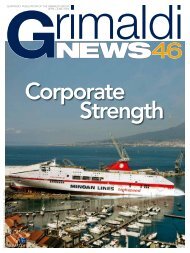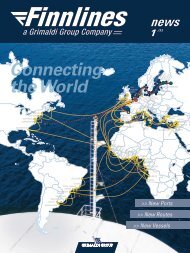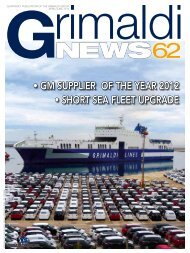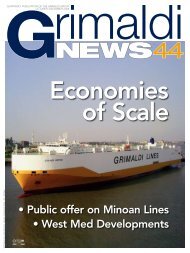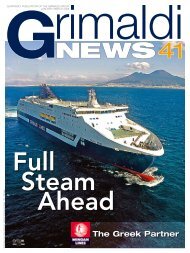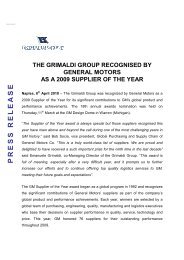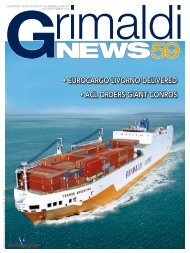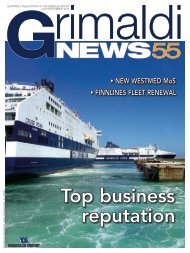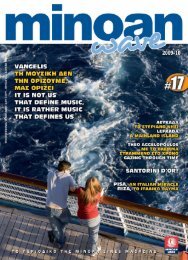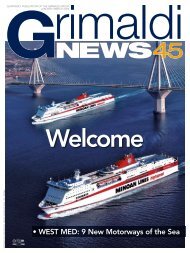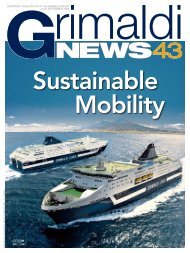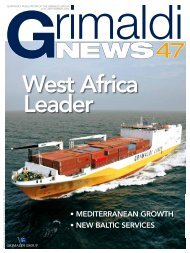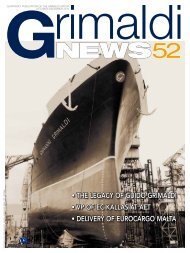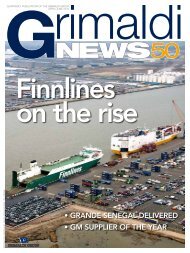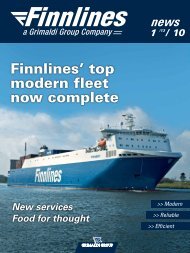Finnlines - Grimaldi Group
Finnlines - Grimaldi Group
Finnlines - Grimaldi Group
You also want an ePaper? Increase the reach of your titles
YUMPU automatically turns print PDFs into web optimized ePapers that Google loves.
The ships in question are <strong>Finnlines</strong>’ five<br />
Star-class Ro-Pax ferries, glossy young<br />
thoroughbreds with capacity for 4,200<br />
lane metres of rolling cargo and 500 passengers.<br />
Capable of 25 knots, they also have<br />
speed to burn.<br />
As <strong>Finnlines</strong>’ chief executive explains,<br />
however, their fate over this last year also<br />
makes them a useful metaphor for the changes<br />
that have taken place at the company over<br />
that period.<br />
From sorry victim to Exploiting thE<br />
rEcovEry<br />
A year ago, two of the five were operating<br />
between Malmo and Travemunde, “a trade<br />
where in places you can only go at five or six<br />
knots because of the wind farms along the<br />
route.” They were, in effect, hobbled. Now<br />
they have been given their head.<br />
All five ships, which he calls “among the<br />
most modern and efficient in the world,” are<br />
now operating on routes through Helsinki<br />
that demand exactly their kind of speed and<br />
size. It was a question, Mr Bakosch says, “of<br />
using our best ships to support the Finnish<br />
economy to the maximum.”<br />
But it was considerably more than that.<br />
Matching the right ships to the right routes<br />
for maximum efficiency was one element in<br />
a sweeping overhaul of <strong>Finnlines</strong> designed to<br />
transform it from a sorry victim of the financial<br />
downturn into a company poised to exploit<br />
the recovery. The vessels, he says, are<br />
fun to watch becoming productive.<br />
NETWORK<br />
Baltic Sea<br />
North Sea<br />
Russia<br />
Mediterranean Sea<br />
Cork<br />
Setubal<br />
Wallhamn<br />
Göteborg<br />
Kapellskär<br />
Aarhus Halmstad<br />
Esbjerg<br />
Malmö<br />
Hull<br />
Travemünde<br />
Sassnitz<br />
Lübeck Rostock<br />
Immingham<br />
Liverpool<br />
Hamburg<br />
Gdynia<br />
Tilbury<br />
Bristol Sheerness<br />
Amsterdam<br />
Flushing<br />
Southampton Antwerp<br />
Bilbao<br />
Valencia<br />
Savona<br />
dEEp undErstanding oF thE company –<br />
and Quickly!<br />
The story of the Star-class ferries, however,<br />
is symptomatic of the problems afflicting<br />
<strong>Finnlines</strong> before Mr Bakosch’s arrival last<br />
year. A year ago, it was disorganised enough<br />
not just that the wrong ships were running<br />
on the wrong routes, but that individual ships<br />
were handling their own procurement, a very<br />
costly way of doing things.<br />
It was also weighed down with assets and<br />
companies – 49 separate companies, for instance,<br />
compared with 27 now – that often<br />
bore little relation to its core business and<br />
delivered less still to the bottom line. And<br />
it was detached enough from the wealthgenerating<br />
possibilities of its own operations<br />
that major potential profit centres, such as<br />
the passenger business, were all but ignored.<br />
As Mr Bakosch puts it, the last year has<br />
been about putting as much right as possible.<br />
He says “we had to go down to the 17th<br />
level of the mine to really understand the<br />
company, and we had to do it quickly.” They<br />
went to work. Cost reduction was immediately<br />
high on the agenda, and the company<br />
made significant gains both in cutting back<br />
port expenses and bunker costs.<br />
Focus on FlEEt and routE optimisation<br />
Optimising the assets was also a critical part<br />
of the campaign to get the company fit again.<br />
<strong>Finnlines</strong> reallocated ships where they were<br />
most suited, including new routes to Poland<br />
and Germany. But it also began a major effort<br />
Monfalcone<br />
Venice<br />
Koper<br />
Ravenna<br />
Livorno<br />
Rauma<br />
Naantali<br />
Turku<br />
Kotka<br />
Helsinki<br />
St. Petersburg<br />
Civitaveccia<br />
Yenikoy<br />
Cagliari<br />
Salerno<br />
Palermo<br />
Gemlik<br />
Izmir<br />
Trapani Catania<br />
Tunis<br />
Malta<br />
Piraeus<br />
Limassol<br />
Mersin<br />
Latakia<br />
Tartus<br />
Beirut<br />
Tripoli<br />
Haifa<br />
Al Khums<br />
Tobruk<br />
Alexandria<br />
Ashdod<br />
to winnow down the chartered component of<br />
its fleet, which had become ruinously expensive<br />
as demand plunged with the financial<br />
crisis.<br />
Over the course of the year, <strong>Finnlines</strong><br />
redelivered nine chartered vessels to their<br />
owners and four more will follow this year,<br />
substantially reducing the average age of the<br />
fleet as well as the company’s costs.<br />
<strong>Finnlines</strong> also moved to sell off non-core<br />
assets, from flats, warehouses and car parks<br />
to container port operations and a cement<br />
port business, that were in many cases both<br />
a distraction and a cost. And it focused hard<br />
on yield management, adjusting prices meticulously<br />
to lure in new traffic, filling its<br />
ships to the gunwales where in the past such<br />
efforts were lackadaisical at best.<br />
BEnEFits From closEr knit grimaldi<br />
opErations<br />
In circumstances such as this, the benefits of<br />
being part of a larger group come very quickly<br />
into focus. Mr Bakosch says synergies<br />
with its parent company, the Naples-based<br />
<strong>Grimaldi</strong> <strong>Group</strong>, have been a critical element<br />
behind <strong>Finnlines</strong>’ turnaround thus far, and are<br />
likely to prove highly beneficial as the recovery<br />
gets underway in earnest. Centralising<br />
procurement in <strong>Finnlines</strong> and other costs had<br />
an immediate impact because of the economies<br />
of scale it made possible, but there was<br />
more to it than that.<br />
While <strong>Finnlines</strong> expanded its network<br />
around the Baltic, it also began to knit itself<br />
7



